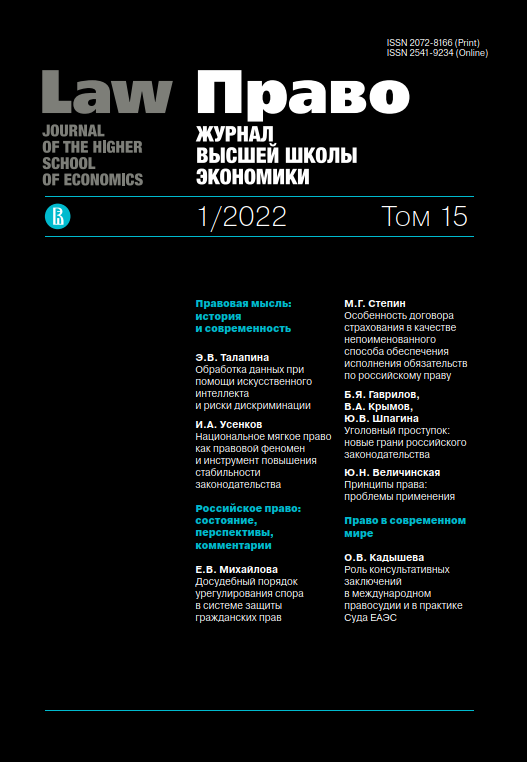National Soft Law as a Legal Phenomenon and a Tool for Increasing Stability of Legislation
Abstract
The subject of the study is the phenomenon of soft law in relation to national law. The purpose of the study is to analyze this phenomenon and identify its essence, role and place, as well as its impact on legal stability. The methodological apparatus of the article is formed on the basis of methods of formal logic, system and structural analysis, thought experiment, methods of legal forecasting and interpretation of legal norms, modeling using ideal models, comparative analysis and extrapolation. Based on the analysis of current achievements of foreign and domestic scientific thought, the signs of soft law are identified and systematized, allowing it to be distinguished from both traditional law and non-legal phenomena. This analysis is carried out in the context of updating the category of “soft law”, which has been widely studied in relation to international relations, to national legal systems. The author’s definition and classification of soft law are proposed, the phenomenon of “legal legitimacy” and the determinants of the creation of soft law are revealed. The conclusion is formulated that in order to recognize the soft-legal essence of the norm, it is necessary that it, without possessing at least one of the mandatory features of the norm of traditional law, most often mandatory normativity, be able to generate indirect legal consequences or significant consequences of a non-legal nature. Some official documents are also considered, which are widely represented in the domestic legal regulation and can be designated as acts of national soft law. An attempt has been made not only to postulate their special status, but also to justify the presence of signs of soft law in them. According to the results of the study, it is possible to declare the presence of such signs in official explanations, planning documents and acts of a recommendatory nature. The influence of such documents on the stability of Russian legislation is also considered. Their significant potential in this area has been revealed, since acts of national soft law, firstly, have greater stability in themselves than acts of traditional law, and secondly, they allow avoiding additional changes in legislation.
References
Alekseev S.S. (2002) Climbing to the right. Searches and solutions. Moscow: Norma, 608 p. (in Russ.).
Chinkin C. (1989) The Challenge of Soft Low: Development and Change in international Low. Cambridge: University Press, vol. 38, no 4, pp. 850-866. DOI: https://doi.org/10.1093/iclqaj/38.4.850
Chudnova E.I. (2018) Strategic planning in the use of the land fund: Russia and Scotland, comparison experience. Jurist=Lawyer, no 4, pp. 33-39 (in Russ.) DOI: https://doi.org/10.18572/1812-3929-2018-4-33-39
Demin A.V. (2015) Principle of certainty of taxation. Moscow: Statut, 368 p. (in Russ.)
Eremin S.G. (2020) Modern classification of internal sources of «soft law» as a source of financial law in Russia. Pravo I Economica=Lawand Economics, no 2 (384), pp. 63-71 (in Russ.)
Filipenko V.A. (2021) Soft law: essence and reflection in corporate legal relations. Voprosi Rossiiskogo pravosudia=Questions of Russian justice, no 11, pp. 281-293 (in Russ.)
Finnemore M., Toope S. (2001) Alternatives to «Legalization»: Richer Views of Low and Politics. International Organization, vol. 55, no 3, pp. 743-758. DOI: https://doi.org/10.1162/00208180152507614
Georgieva Z. (2015) Soft Law in EU Competition Law and its Judicial Reception in Member States: A Theoretical Perspective. German Law Journal, no 16(2), pp. 223-260. DOI: https://doi.org/10.1017/S2071832200020836
Gribnau H. (2007) Soft Law and Taxation: The Case of the Netherlands. Legisprudence, vol. I, no 3, pp. 291-326. DOI: https://doi.org/10.1080/17521467.2007.11424668
Hillgenberg H. (1998) «Soft Law im Völkerrecht». ZEuS, no 1, pp. 81-102.
Howells G. (1998) Soft Law in EC Consumer Law. Lawmaking in the EU. Craig and Harlow, 453 p.
Knauff M. (2021) Coronavirus and Soft Law in Germany: Business as Usual? European Journal of Risk Regulation, no 12(1), pp. 45-58. DOI: https://doi.org/10.1017/err.2020.113
Lyubchenko M.Y. (2017) Decisions of the European Court of Human Rights as «soft law». Bulleten grazhdanskogo prosessa=Bulletin of civil proccess, vol. 7, no 3, pp. 256270. (in Russ.)
Meyer T. (2008) Soft Law as Delegation. Fordham International Law Journal, vol. 32, no 3, pp. 888-942.
Nasser S. (2008) Sources and Norms of International Law: A Study on Soft Law. Galda Verlag, 197 p.
Parella K. (2020) Hard and Soft Law Preferences in Business and Human Rights. AJIL Unbound, no 114, pp. 168-173. DOI: https://doi.org/10.1017/aju.2020.33
Polyakov M.M., Okrokova E.S. (2018) Disciplinary responsibility of civil servants for violation of legislation in the field of strategic planning and combating corruption. Actualni problemi rossiiskogo prava=Actual problems of Russian law, no 8 (93), pp. 63-71 (in Russ.)
Romanova M.E. (2017). The role of soft law acts in the customs law of the European Union. Tamozhennoe pravo=Customs, no 2, pp. 37-40 (in Russ.)
Sandugei A.N. (2019) On the assessment of the implementation and the prospects for improving the fundamental document of strategic planning in the field of ensuring public safety. Administrativnoe pravo I process=Administrative law and process, no 8, pp. 45-48 (in Russ.)
Schäfer R. (2020) Soft law im System des Völkerrechts. JuS, no 83, pp. 827-831.
Schuppert G. (2000) Verwaltungswissenschaft. Verwaltung, Verwaltungsrecht, Verwaltungslehre. Baden-Baden: Nomos Verlagsgesellschaft, 1023 p.
Shelton D. (2006) International Law and «Relative Normativity». International Law. M. Evans (ed.). Oxford: Oxford University Press, 2nd ed., 898 p.
Volova L.I. (2019) Features of legal regulation of international tax relations. Finansovoe pravo=Financial Law, no 7, pp. 31-35 (in Russ.)
Walter R. (2005) Soft Law aus rechtstheoretischer und verfassungsrechtlicher Sicht. In: Soft Law in der Praxis. M. Lang et al. (eds.). Vienna: Linde, pp. 21-28.
Winkelmüller M. (2020) Rechtssicherheit bei Corona-Schutzmaßnahmen. ARP, no 30, pp. 187-190.
Zhavoronkova N.G., Vypkhanova G.V. (2020) Legal problems of strategizing in environmental law. Lex russica, no 1, pp. 28-42 (in Russ.) DOI: https://doi.org/10.17803/1729-5920.2020.158.1.028-042
Copyright (c) 2022 Law Journal of the Higher School of Economics

This work is licensed under a Creative Commons Attribution-ShareAlike 4.0 International License.


















